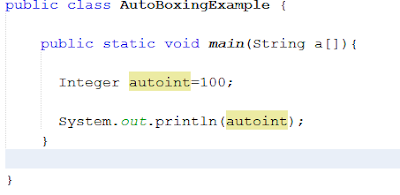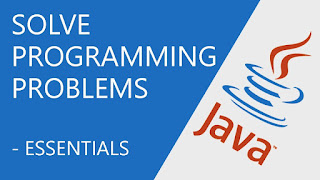Wrapper Class in Java
Java is Object Oriented Programming language and can be view
everything as an object i.e. a file can be treated as an object, image can be treated as an object and similarly
primitive data type which are not object can be treated as an object (with Wrapper
class).
In simple way we can define
Wrapper class is a mechanism to convert primitive
data type into an object and also an object in to primitive data type.
for example :Suppose num1 is an ineteger variable like this
int num1;
we want to create an object of num1 then with help of
wrapper class it is possible i.e. we can create an object of num1 of its corresponding wrapper class
Integer like this
Integer n1 =new Integer(10);
num1=n1;
Note : java.lang package contains Wrapper classes
The eight classes of java.lang package are
known as wrapper classes in java, following table
Contains Primitive data and its corresponding wrapper class.
| Primitive Data Type | Wrapper Class |
|---|---|
| boolean | Boolean |
| char | Character |
| byte | Byte |
| short | Short |
| int | Integer |
| long | Long |
| float | Float |
| double | Double |
Auto Boxing and UnBoxing
Whenever we talk about Wrapper class then a question arises
in our mind.
Is it possible that Java compiler automatically
converts primitive data types into object and vice versa?
Then
answer is yes Java version 1.5 and onwards it is possible that Java compiler
automatically converts primitive data type into object and object in to
primitive data type, and technical terms used for this operation is AutoBoxing
and UnBoxing.
Simplest example of AutoBoxing :
public class AutoBoxingExample {
public static void main(String a[]){
Integer autoint=100;
System.out.println(autoint);
}
}
OutPut :
When AutoBoxing occured ?
AS we discussed previously AutoBoxing is process of
automatically conversion of primitive data type to object and AutoBoxing occurred
in these following situations :
- Passed as a parameter to a method that expects an object of the corresponding wrapper class·
- Assigned to a variable of the corresponding wrapper class.
Passed as a parameter to a method that expects an object of
the corresponding wrapper class .
Example:
public class AutoBoxing2 {
public static void checkMethod(Integer num){ //pass as an Argument
System.out.println(num);
}
public static void main(String a[]){
checkMethod(2);
}
}
OutPut :
Assigned to a variable of the corresponding wrapper class.
public class AutoBoxingExample {
public static void main(String a[]){
Integer autoint=100;
System.out.println(autoint);
}
}
OutPut :
UnBoxing : UnBoxing is the process of automatically
conversion of object to primitive data
type.
When UnBoxing Occurred ?
UnBoxing is process
of automatically conversion of object of
wrapper type to its primitive data type.
The Java compiler applies unboxing when an object of a
wrapper class is.
- Passed as a parameter to a method that expects a value of the corresponding primitive type.
- Assigned to a variable of the corresponding primitive type.
Example :
public class UnBoxingExample {
static void checkMyMethod(Integer num){
System.out.println(num);
}
public static void main(String a[]){
Integer numVal=new Integer(100);
checkMyMethod(numVal);
}
}








Comments
Post a Comment